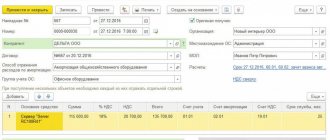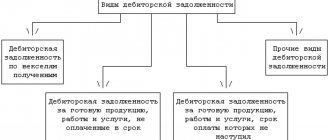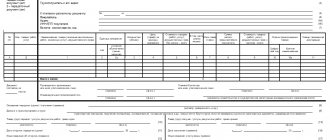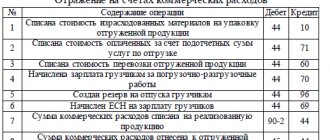When is it permissible to write off VAT on expenses?
In general, according to paragraph 1 of Art. 170 of the Tax Code of the Russian Federation, the amounts of input VAT (that which you pay when purchasing goods, works, services, rights or carrying out import transactions) are not included in the expenses taken into account when calculating income tax (or personal income tax). However, this does not apply to the situations listed in paragraphs. 2 and 5 tbsp. 170 Tax Code of the Russian Federation. VAT can be attributed to expenses if:
- the purchased goods or services are planned to be used in VAT-free transactions (confirmation of this position is in letters of the Ministry of Finance of the Russian Federation dated November 2, 2010 No. 03-07-07/72 and 04.13.2009 No. 03-03-06/1/236);
- the place of their implementation is not Russia (letter of the Ministry of Finance of the Russian Federation dated October 1, 2009 No. 03-07-08/195);
- you, as a taxpayer, are exempt from paying VAT or are not a payer of this tax due to the use of special tax regimes (letters of the Ministry of Finance of Russia dated November 11, 2009 No. 03-07-11/296 and dated September 3, 2009 No. 03-11-06/3/227 );
- acquired inventory, services or rights will be used in operations not recognized as sales;
- assets were acquired by banks, non-state pension funds, insurers, clearing companies, trade organizers, professional stock market participants and similar organizations (in strictly established cases).
NOTE! You can write off not only input VAT as expenses, but also tax calculated for payment if you paid it at your own expense, without presenting it to the buyer, or write off accounts receivable for goods shipped but not paid for.
Read about it here .
ConsultantPlus experts explained how to take VAT into account in expenses in accounting and tax accounting, as well as when calculating taxable profit. Get trial access to the system and move on to the Ready-made solution for free.
Recognition of expenses when transferring goods for own needs
An interesting aspect is related to the interpretation of the moment of recognition of an expense. For example, when an expense was not timely taken into account as part of the taxable base for profit, but potentially belongs there.
For example, the resolution of the FAS of the East Siberian District (registered by the FAS VSO dated March 6, 2008 No. A33-7812/2007-F02-683/2008) states that it does not require that the recognition of expenses on profit occur in the tax period when the transfer of goods for own needs (as well as works or services).
Similarly, the Federal Antimonopoly Service of the Moscow District (registered by the Federal Antimonopoly Service of the Moscow Region dated 03.11.2006, 07.11.2006 No. KA-A40/10762-06) recognized as invalid the argument of the tax authority that if expenses are not included in expenses that reduce taxable profit, based on the results of each calendar month tax period, it is necessary to pay VAT on the transfer of goods for one’s own needs.
Unfortunately, having examined the current regulatory framework and current court decisions, it was not possible to draw any other conclusions.
According to the author, this rule is rarely applied by tax authorities in the current economic situation. After all, the transfer of goods exclusively for the organization’s own needs without the possibility of reducing the tax base is rare. Now tax inspectors are much more interested in investigating the dishonesty of counterparties and withdrawing VAT deductions on this basis.
One of the most common situations is the transfer of goods to their “social” objects (which do not receive any income), be it transferring their products to their own holiday home or providing services to their own cottage village for employees.
Thus, an object of VAT taxation may arise even if the goods were initially purchased (or their own products were produced) for ordinary (entrepreneurial) activities, and then the organization changed their purpose and used them for its own needs.
But in a situation where an organization initially knows that it purchased goods for transactions not subject to VAT (for example, for a free sports club on the balance sheet of the organization), then such an object of VAT taxation as the transfer of goods for its own needs does not arise. By the way, in this case there is no right to deduct “input” VAT on such goods - the tax will need to be initially taken into account in the cost of these goods.
Example of writing off VAT on expenses: postings
As an example, consider the following situation: a Russian research institute purchases materials to carry out research work, and their payment is made from the federal budget.
Since according to sub. 16 clause 3 art. 149 of the Tax Code of the Russian Federation, such an operation is exempt from VAT; input tax in this case is not deducted, but is included in the cost of materials.
In postings, this operation will look like this:
- Debit 10 credit 60 (materials purchased).
- Debit 19 credit 60 (input VAT on purchased materials is reflected).
- Debit 10 credit 19 (input VAT is included in the cost of purchased materials).
Options for writing off VAT on expenses
The moment at which VAT is written off as cost is not the same for different tax regimes. Let's consider the main cases.
- Taxpayers who use UTII include the VAT amount in the cost of goods or materials as they are recorded.
- Taxpayers working on the simplified tax system for “income” have the right to take into account VAT in expenses at the time at their own discretion - the taxation procedure will not change. After all, expenses do not affect the object of taxation - income.
- For simplified people who use the simplified tax system “income minus expenses”, VAT on acquired assets can only be taken into account after their sale.
And of course, we must never forget that in order to write off VAT on expenses, you must have supporting documents.
To learn how VAT will be reflected in the book of income and expenses, read the article “How to take into account input VAT under the simplified tax system?” .
Next, we will consider several practical situations and the corresponding rules for writing off VAT.
Correct paperwork
You can highlight some nuances when preparing documentation when writing off a payment. Most often, documentation is drawn up in a special program - 1C. You can generate a “Write-off” document by entering based on receipt or by selecting the journal of routine operations and creating a new document.
To fill in the “tax to be written off” parameters, you can use the data from account 19 in the “Value added tax presented” register. The name of the document that serves as the basis and information about the supplier, amount and invoice are registered in the program automatically. Additionally, you will need to fill in data on the tax amount, indicate the type of value and interest on tariffs.
Write-off of VAT on costs under the simplified tax system
According to officials, simplifiers can write off VAT on expenses only after the sale of the acquired asset (letters from the Ministry of Finance of Russia dated February 17, 2014 No. 03-11-09/6275 and dated September 24, 2012 No. 03-11-06/2/128).
The justification for this position is that, according to sub. 23 clause 1 art. 346.16 of the Tax Code of the Russian Federation, when calculating the tax base, one should take into account the costs of paying for the cost of inventory items acquired for subsequent sale (with their reduction by VAT amounts).
In accordance with sub. 3 p. 2 art. 346.17 of the Tax Code of the Russian Federation, expenses for paying taxes of companies using the simplified tax system are accepted based on the amounts actually paid.
According to sub. 8 clause 1 art. 346.16 of the Tax Code of the Russian Federation, simplifiers who use the “income minus expenses” scheme reduce their income by expenses in the amount of VAT on paid goods and materials and services.
According to the rules established by sub. 2 p. 2 art. 346.17 of the Tax Code of the Russian Federation, expenses for paying the cost of inventory items purchased for subsequent sale are taken into account in the tax base as they are sold.
Summarizing the above, officials state that VAT on purchased goods under the simplified tax system can only be taken into account after their sale.
Is it possible for simplifiers to deduct VAT paid at customs when importing goods into Russia? Find out in ConsultantPlus. If you don't already have access to the system, get a free trial online.
If the company is not a micro-enterprise
Since non-deductible VAT cannot be taken into account when taxing profits, the company will have ongoing tax obligations. In practice, this means that most companies, due to VAT, which is not deductible, face the prospect of constant explanations by the Federal Tax Service for the difference in the company’s profit.
Let us remind you that accounting and tax profits are carefully studied:
- tax authorities;
- external users of financial statements.
In order to reduce such risks, it is better to prepare for the results issued by ASK VAT-2 in advance, namely:
- keep primary documents in order;
- do not miss the 3-year period when VAT for previous periods can be claimed for deduction.
It is especially important to track VAT for past periods if the company was summoned to the VAT tax commission, where the inspectors stated that the VAT-2 ASK had identified suspicious invoices issued to the company. Recently, such warnings have often been received even before the company has reflected invoices that raise questions in the declaration.
Often, tax officials convince CEOs that in the next three years, controversial invoices may no longer raise questions, and they can be presented for deduction
Recently, such warnings are often received even before the company has reflected invoices that raise questions in the declaration. Often, tax officials convince general directors that in the next three years, controversial invoices may no longer raise questions, and they can be presented for deduction.
Do simplifiers need an invoice to write off VAT as expenses?
From 10/01/2014, sellers are allowed not to issue invoices to simplified buyers. However, for this it is necessary to sign a special agreement stating that invoices will not be issued (subclause 1, clause 3, article 169 of the Tax Code of the Russian Federation). This is also evidenced by letters from the Ministry of Finance (in particular, dated 09/05/2014 No. 03-11-06/2/44783).
See the material “Additional agreement on the abolition of the obligation to issue invoices when executing a contract for the supply of goods to a person who is not a VAT payer .
In this case, such an agreement can be executed electronically.
If there is no such agreement, then the issue of the availability of an invoice is resolved ambiguously, and the opinions of officials are divided.
Thus, in the letter of the Federal Tax Service of Russia for Moscow dated June 28, 2006 No. 18-11/3/ [email protected] it is reported that in order to include VAT as an expense, an invoice is required (along with supporting documents for payment, acts, invoices). Moreover, letter No. 03-11-04/2/147 of the Ministry of Finance of the Russian Federation dated September 24, 2008 states that the invoice must not only be available, but must also be filled out correctly.
However, earlier in a letter from the same department dated October 4, 2005 No. 03-11-04/2/94, it was stated that the document confirming the costs of paying VAT for simplifiers is a payment order.
As for the courts, they believe that in this case not only invoices, but also other primary documents are suitable (for example, the resolution of the Federal Antimonopoly Service of the Volga-Vyatka District dated September 19, 2005 No. A31-8435/19). And the tax authorities themselves admitted in their later letters that in order to take into account the amounts of VAT paid in expenses, bills and invoices would be sufficient (letter from the Federal Tax Service of Russia in Moscow dated July 19, 2011 No. 16-15/ [email protected] ).
And yet, since today the law officially allows simplifiers not to issue invoices, it is more advisable to draw up an agreement on the non-issuance of these documents. It will take a little time, but in the future you won’t have to guess how officials and judges will once again calculate.
Results
From the general rule about the impossibility of including VAT in expenses, the Tax Code of the Russian Federation makes several exceptions, which include the further use of the purchased item in transactions not subject to VAT. In particular, VAT can be included in expenses when applying special regimes. With a number of features under special regimes, the moment of inclusion in expenses is determined.
Sources: Tax Code of the Russian Federation
You can find more complete information on the topic in ConsultantPlus. Free trial access to the system for 2 days.







